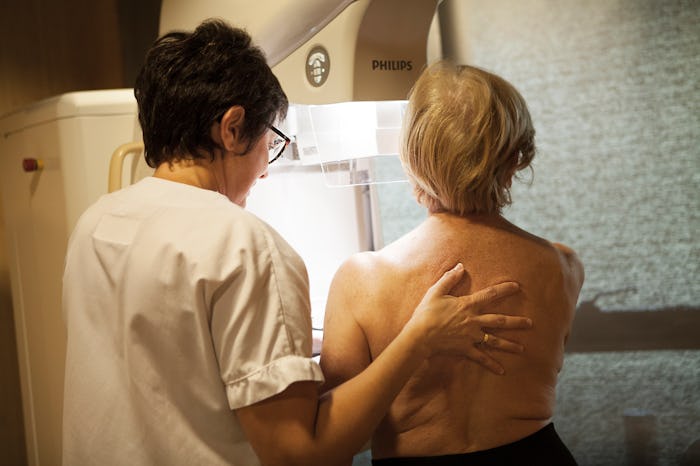Life

Is A Dimple On Your Breast A Sign Of Breast Cancer? Experts Weigh In
Let's talk about boobs, shall we? Specifically, the surface texture of our breasts. We understand that breast appearance will change as we age and as many of us get pregnant, but what changes are dangerous or potentially cancerous? If you know to look for lumps, should you be concerned that a dimple on your breast is a sign of breast cancer?
I contacted several experts in the field to find out just what those little dimples and divots could mean, and as it turns out, there is cause for concern if you see dimpling on your breast. Jane Kakkis, MD, surgical oncologist and medical director of breast surgery at MemorialCare Breast Center, tells Romper, "Any changes in the skin or shape of the breast could potentially represent breast cancer. If the skin changes and starts to look like the peel of an orange, that is very concerning for a type of breast cancer called inflammatory breast cancer."
She adds that this dimpling is often accompanied by changes in color of the skin or pinkness of the skin, too. "Sometimes breast cancers that grow closer to the underside of the skin can form attachments there that pull the skin in towards the cancer," Kakkis adds.
It's a lot to take in, but important. No one knows your boobs like you do, so no one will notice a change like you will. Is a dimple on your breast a sign of breast cancer? It might be, it might not be, but chances are, you're going to be the one to see it first. Dr. Mediget Teshome, Department of Breast Surgical Oncology at Texas MD Anderson Cancer Center agrees with Kakkis, telling Romper, "Nipple changes such as retraction or inversion, scaly rash, or bloody discharge are also things to watch out for."
Healthline reported that many women are born with inverted or retracted nipples, and that there is no cause for concern in these women — it's just a fluke of genetics. However, when women with normally protruding nipples have nipples that suddenly flatten against the breast or become inverted, especially when paired with dryness or discharge, this could be a sign of ductal breast cancer or carcinoma, and needs to be addressed with a healthcare provider. Certain changes are expected during the course of a woman's life. This, however, is not one of them.
Everyone knows boobs can be temperamental. They hurt at different points of our cycles, they grow, things get excited, and when we're pregnant and breastfeeding, just hold the phone. But that doesn't mean you stop noting the abnormal. And Teshome notes that it's not just women or people with larger busts who need to worry. She says that anyone with new breast skin changes "should be evaluated by their doctor for a clinical breast examination and to determine if additional testing such as mammogram, ultrasound or biopsy is needed."
That doesn't mean that if you see dimples, it's always breast cancer. Conditions like fibromatosis of the breast (a benign tumor) can cause dimpling, and it looks very much like breast cancer, according to The National Institutes of Health (NIH). Also, women with previous breast surgeries, like lifts, reductions, or enhancement, can pucker the skin in ways that mimic the dimpling found in breast cancer, the NIH found.
It's scary, and it might be all for nothing, but it's better to know. As someone who has had multiple "scary scans," I get the fear and the desire to ignore it, but in this case, it's better safe than sorry. Be concerned, be proactive, but don't panic. The treatment of cancer is constantly improving, and more people are seeing better outcomes than ever, and that is truly comforting. Just continue your self-checks and note any changes in your breasts with your healthcare provider.
Experts:
Jane Kakkis, MD, surgical oncologist and medical director of breast surgery at MemorialCare Breast Center at Orange Coast Medical Center in Fountain Valley, California
Dr. Mediget Teshome, Department of Breast Surgical Oncology at Texas MD Anderson Cancer Center